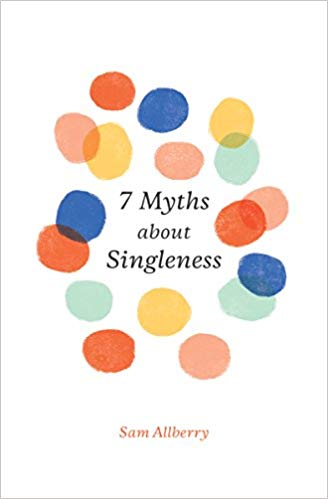It’s not the singleness that’s hard as a woman in my 30s in the church. I would love to be married, but I’m not desperate. If that’s what the Lord has, great. If not, then that’s OK. In the past that hasn’t always been easy to feel or say, and it may not always be easy in the future. But, I want what God wants, and I’m happy serving him single.
The hard part is the cultural shame of singleness; being seemingly unwanted and undesirable is painful. The shame in the Church of being abnormal or feeling as if I’m being perceived as a pariah presses in. The older I get, the weirder I feel. However, Scripture gives honor and belonging to singles like me. Our Savior, the perfect picture of humanity, was himself single, which gives dignity to my single status. And Christ has placed all of us, whether single or married, in a family, giving us a place, a purpose, and an ultimate aim—Christlikeness.
Because of the fight against shame and the desire to think rightly about singleness, I was thankful to pick up Sam Allberry’s book 7 Myths about Singleness. Whether you are single or married, you probably can check one or two boxes from his list of myths that you have believed or partially embraced. As one who has encountered many of these myths, here are five of my takeaways from this book:
1. Singleness shows the sufficiency of the gospel.
Marriage is a good gift designed by God. Yet, sometimes it is communicated that the family is the primary way God chooses to work, display himself, and advance his Kingdom. Marriage has a unique role in displaying the gospel, but so does singleness. Allberry points out, “If marriage shows us the shape of the gospel, singleness shows us its sufficiency” (120).
We live in a day and age where sex is ultimate and is believed to be best if it is without restraint. Allberry, however, shows that the Bible’s way is different, teaching that sex is designed to be exclusively experienced in marriage between one man and one woman. Many in the Western world believe that “our sense of personhood is directly attached to our sex life” (18). As a result, celibacy is unthought of today.
Sex is not supreme or our identity. And life is not incomplete or lacking for the single person in the Church who is faithfully pursuing sexual holiness. Instead, singleness in devotion to the Lord displays the sufficiency of the gospel to a world that makes sex ultimate.
2. Everyone needs to understand God’s view of singleness, not just singles.
If you are married, you need to read this book too. This is true for several reasons. First, “the Bible’s teaching on singleness is given to all of God’s people” (14), including passages like 1 Corinthians 7. When this epistle was delivered, it was read to the entire church—wives, husbands, singles, and children—because all Scripture is profitable, not just the portions that most directly apply to you.
Christ has placed all of us, whether single or married, in a family, giving us a place, a purpose, and an ultimate aim—Christlikeness.
Secondly, singleness relates to everyone. We all were single at one point, and all who are married now will one day be single again (14). Furthermore, Scripture gives the analogy of the body for how a church functions. We affect one another, so singleness affects all of us (15). Allberry writes, “I have a stake in the health of the marriages in my church family. And those who are married have a stake in the health of my singleness. It’s part of what belonging to one another involves” (15).
3. Singleness isn’t necessarily selfish.
The Church, in rightly honoring the family in a culture that has devalued marriage, has sometimes spoken about singleness in an unbiblical or unnuanced way. While addressing the delaying of marriage in culture today, I’ve heard pastors chastise singleness itself. But Paul wrote that he wished more were like him in his singleness (1 Cor. 7:7), acknowledging that it has its advantages for the Kingdom (1 Cor. 7:26-35).
Singleness can be selfish, but it can also be purposeful. Allberry writes, “The issue is what singleness is being used for. To call singleness itself a ‘threat to marriage’ is to speak about it in a profoundly unbiblical way that I am sure would astonish Paul . . . We mustn’t blame selfishly deferring marriage on singleness any more than we should blame selfishness in marriage on marriage itself” (45). Allberry righly challenges those who are selfish without demeaning those who are single and serving well.
4. Singles should find a family in the church.
All of us were created to live in community. It wasn’t good for Adam to be alone, but it’s not good for singles to be alone either. Marrieds and singles need one another. And God has given us a forever family through the Church.
Allberry talks about married people welcoming singles into their families and routines. Allberry points out that “the boundary of your family life needs to be porous for your family’s own good” (78). While it may sound crazy to a young parent to invite someone to kid drop-offs or pick-ups from school or to chop carrots and help prepare dinner, some of us singles enjoy those things. Being invited into the ordinary moments of a family is a real joy and gift. When we seek to incorporate one another into our lives, we’re often blessed because “the physical and spiritual families we belong to need each other” (77).
5. Singleness and marriage are both good gifts.
God is the one who created us, knows us, and gives us the gifts of singleness or marriage. Allberry writes, “He is the Creator who made you and knows you. He is the One who orders all things and does so for your good. . . . If we balk at the idea of singleness being a gift, it is not because God has not understood us but because we have not understood him” (38).
Allberry is biblically balanced and honest about the challenges and blessings of singleness and marriage. He writes, “The fact is, both singleness and marriage have their own particular ups and downs. The temptation for many who are single is to compare the downs of singleness with the ups of marriage. And the temptation for some married people is to compare the downs of marriage with the ups of singleness, which is equally dangerous.” The contrast between the two is not between good and bad or easy and hard, but between “complexity and simplicity” (31).
Even now as I review several of my takeaways from this book, I’m encouraged. As a single, I am of benefit to the Church. And, as a single I’m not waiting for marriage to be able to display the gospel; I display it now by showing the sufficiency of Jesus Christ. It doesn’t point to rejection, but reminds me of my great acceptance by a loving and sovereign God.
If you want to understand God’s design and purposes for singleness, read this book. It’s needed in the Church and in this day and age to help us understand God’s purposes for singleness and his plan for singles. It has helped remind me that my singleness isn’t a source of shame but simply another way that God is working for my good and his glory. Anyone would enjoy this well-written, thought-provoking book. You will be encouraged and spurred on to love, good deeds, and service in the body of Christ.










